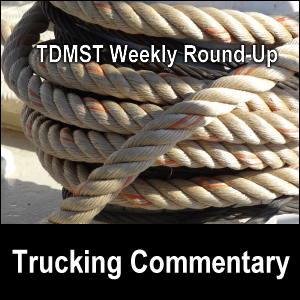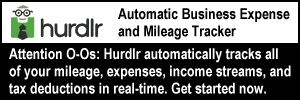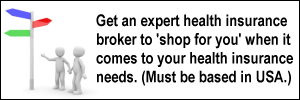This is the TDMST Weekly Round-Up of news affecting professional truck drivers, written by Vicki Simons for the week ending May 2, 2020.
We welcome your comments, thoughts and feedback on the items of your choice below.

1. Regarding low freight rates:
Many articles have been written, many videos have been recorded, and numerous events have begun to take place regarding low freight rates.
Some folks claim that brokers are exploiting the coronavirus (COVID-19) crisis for their own benefit.
I am pasting below the articles I have found.
Please use best practices and common sense when obtaining loads.
- Survey: Truck Drivers Voice Pay Concerns During COVID-19
- Broker Group CEO Blasts Critics, Says Rates Will Go Up When Carriers Reject Low Offers
- Trucker’s Social Media Videos to Expose Big Brokers Go Viral, Brokers Fire Back
- Group Calls for Investigation Into Large Brokers, Alleges “Conspiracy With Big Trucking”
- What Every Price Gouging Freight Broker Hopes Truckers Won’t Ask
- California Truckers Convoy in Protest Against Low Rates and “Cheap Brokers”
- New Petition Demands President Trump, FMCSA Force Brokers to Offer Better Rates
- Head Of Broker Group Says Truckers Can Blame Themselves For Low Rates, Not Brokers
- Drivers, other industry insiders weigh in on issue of dropping freight rates
- Owner-operators plan ‘mayday’ protests to bring awareness to drastic decline in rates, broker operations
- A carrier’s right to review what the shipper paid the broker
- Survey shows owner-operators hit hard by coronavirus
- Truck rates down despite states reopening fro COVID-19 shutdowns
- Volumes showing signs of life, but it doesn’t help the carriers much
- Truckload rates are dangerously low for carriers
www.dat.com/blog/post/the-economy-wont-reopen-without-trucks (no longer online) - Truckers Rallying in D.C. Send Out “MayDay” Distress Call to President Trump
- Truckers say they’re facing another pandemic — ‘cheap rates’ from brokers
- DOJ to Meet With Trucking Group Over Allegations of Broker “Price-Fixing”
- Southern California truckers organize for ‘slow roll’ looking to raise awareness of low freight rates
- Truckers begin ‘slow roll’ at the Port of Los Angeles
- ‘Mayday’ protests begin; exploring the issues and looking at what can be done
- Truckers protest in DC
- Refusing to run at a loss: A solution for low freight rates
- Truckers make ‘distress call’ to Trump in D.C.
- OOIDA sets sights on unscrupulous brokers
- Pandemic offers opportunity to end the tug of war between carriers, shippers
- ‘Mayday’ protest underway at nation’s Capitol as truckers protest low rates
- Battalion of bobtails slow roll on Chicago expressway for ‘Mayday’ trucker demonstration
- Trucking group issues warning about ‘unscrupulous’ brokers
- Truckers use horns to sound ‘Mayday’ message — S.O.S. — in D.C.
The Owner-Operator Independent Drivers Association (OOIDA) sent out an email on Friday, May 1, 2020, which stated, in part:
We are aware that freight rates are at historic lows. Trucking has often suffered from chronic overcapacity – too many trucks and trailers and not enough freight. The resulting market conditions (i.e. low rates) are magnified right now. While there is no quick or easy solution, hauling cheap freight is not a viable or sustainable approach and we strongly advise against it – just as we always have.
We also realize some brokers and shippers are exploiting the ongoing crisis. While federal regulations require brokers to be transparent about certain rate information, there are far too many loopholes that effectively undermine those regulations. We continue to work with FMCSA and Congress to require additional transparency and close as many loopholes as possible. Unfortunately, this will not provide any immediate relief.
You should also be mindful of hauling for brokers that you are not familiar with. Especially during times like this, some unscrupulous brokers have no intention of ever paying carriers and drivers for the services they provide. When someone files a claim against the bond, the result is usually a payment of pennies on the dollar or maybe nothing at all. We refer to this issue as “Broker Bond” and have been trying to get FMCSA and Congress to remedy it for nearly a decade.
Finally, if you have an issue with a broker, we would strongly encourage you to file a complaint with FMCSA’s National Consumer Complaint Database (NCCDB). While the NCCDB is far from perfect, we need complaints to be filed because it helps us show just how broken it is and might hopefully lead to meaningful changes. You can file a complaint by clicking on the following link:
https://nccdb.fmcsa.dot.gov/nccdb/home.aspx.
If you do file a complaint, you should also forward a copy to your lawmakers and OOIDA via questions@ooida.com.
2. Regarding closed rest areas:
Following the layoff of maintenance employees due to Covid-19, the state of Michigan has announced the closure of 5 restroom facilities at Welcome Centers at Coldwater, Detroit, Monroe, New Buffalo, and Sault Ste. Marie, according to articles here, here, here, here and here.
3. Regarding free masks and hand sanitizer:
According to the articles linked below, the FMCSA, DOT, and other entities are giving away face masks and hand sanitizer.
- TruckNews.com: FMCSA: 1 million free masks
- TruckingInfo.com: ATA, Protective Insurance, hand sanitizer
- TruckersNews.com: 1 million free masks
- TruckersNews.com: federal agencies
- TruckersNews.com: 55 gallon drums of hand sanitizer
- Transportation Nation: FEMA: 1 million masks
- Transportation Nation: feds, 800,000 masks at 35 locations
- TheTruckersReport.com: FMCSA: 1 million masks
- TheTrucker.com: ATA. Protective Insurance, ABF, free hand sanitizer refills
- LandLine: FMCSA, protective masks
- FreightWaves.com: Feds, 1 million masks
- CDLLife.com: DOT: 200,000 masks to trucking companies
- CDLLife.com: FMCSA: 800K free masks
- CCJDigital.com: FEMA, 800k masks
- TheTrucker.com: free masks at weigh stations, some rest areas.
Again, please be careful from whom you accept a free mask to make sure it is not laden with chemicals before you put it on.
4. Regarding ELD manufacturer quits:
According to an April 30, 2020, article, “Continental Automotive Systems is discontinuing its line of RoadLog electronic logging devices (ELDs) and giving current customers until mid-August to make a switch.”
Other articles on this topic were written here, here and here.
5. Regarding GATS was canceled:
The Great American Trucking Show has been canceled according to articles here, here, here, here, here and here.
6. Regarding reopening, repositioning and adapting:
Perhaps you will be encouraged or inspired by the following:
- According to an April 29, 2020, article, “Yokohama Corporation of North America has reopened its plant in West Point, Miss., which had been silenced as a precautionary measure in the early weeks of Covid-19.”
- An commentary about how to position a fleet for post-pandemic success stated, “It’s very important that transportation fleets recognize they must be as flexible as possible with their own business models.”
- One fleet hit hard by COVID-19 has found ways to survive.
- We read in a May 1, 2020, article, “J.B. Hunt Transport Services, Inc., announced today a new electronic bill of lading (eBOL) feature that will enable businesses and carriers to digitally sign BOLs, further reducing contact during the delivery process.”
7. Regarding meals: free, paid, or delivered:
Numerous entities have stepped forward to provide either free meals or meals delivered to truckers.
- Thanks to Thank a Trucker for free trucker meals on May 1 in Woodstock, Ont.
- The Canadian province of British Columbia is allowing food trucks at provincially-owned locations.
- Check out the Fueling Our Heroes initiative from CDL Life.
8. Regarding increases:
Some increases are good. Others, not so good.
- The Atlantic Provinces Trucking Association (APTA) has criticized Saint John, New Brunswick’s “proposal to generate $1 million through permit fees from heavy vehicles hauling goods in the city amid the fight against Covid-19.”
- During the week of April 29, 2020, it was reported that “the California Air Resources Board (CARB) released the final draft of the Advanced Clean Trucks (ACT) standard.”
- CoreTrans LLC is increasing driver pay 5 cents per mile.
- Some carriers are “rewarding leased/company haulers,” according to an April 28, 2020, article.
- An April 28, 2020, article stated, “Load posts on the DAT One load board marketplace rose 6 percent last week ahead of news that Texas, Ohio, Georgia, Tennessee and other states were easing lockdown orders.”
- An April 28, 2020, article identified the trucking programs that the “Best Fleets to Drive For” have in common — and how they “outperformed the market” — two of which are “guaranteed pay” and “maximizing uptime.”
9. Regarding declines:
I wish there was better news:
- An April 28, 2020, article stated, “Cummins engine sales were down 19% in the first quarter of 2020, with on-highway engine revenues down 17%, and the off-highway segment dropping 23%.”
- According to an April 28, 2020, article, “Trucks entering Canada declined nearly 33% during the week of April 20 to April 26, compared to the same period last year.”
- An April 29, 2020, article stated that transportation analytics firm INRIX studied the impact of the “COVID-19 pandemic” on freight movement in the U.S. from March 14 through April 17 and found that “commercial truck travel has dipped 13 percent nationwide.”
- No region in the USA has been “more impacted” by COVID-19 than New York City, according to an April 28, 2020, article.
- An April 30, 2020, article states, “ACT Research has created a COVID-19 Market Watch web page to track noteworthy high frequency macroeconomic and transportation-specific market indicators.”
- The worst has yet to come for carrier financials and GDP
- The caption under the large image at the top of an April 28, 2020, article about carriers flocking to a cash-strapped government loan program reads:
More than 80% of fleets surveyed last week said they have seen a decrease in freight levels since the coronavirus pandemic hit the U.S. in early March, with more than half (56%) reporting a significant decrease. Fleets are split on whether there’s more ground to lose, however, with just more than half (55%) saying they expect freight levels to remain the same or increase in the next 30 days, and 45% reporting they expect freight to decrease in that time. This survey data is based on 232 fleet respondents, ranging in size from 10 trucks to those with more than 1,000.
10. Regarding shifting laid off workers to trucking:
With data included in the April 28, 2020, article, we read this quote that is accompanied by a question as to whether the same thing will hold true due to COVID-19:
“After layoffs began to increase during recent recessions, there was a strong influx of new workers into trucking, according to data from the Census Bureau’s Current Population Survey.”
This just makes me wonder: If truckers are sitting idle right now because either there isn’t enough freight to haul or rates are too low, where would workers from outside the trucking get freight that pays them to haul it?
Hmm…
11. Regarding discounts and calls for suspension:
A May 1, 2020, article described 5 time- and money-saving aspects of using transponders for toll management.
An April 29, 2020, article stated, “The American Truck Dealers (ATD) is pushing congressional leaders to suspend the 12% federal excise tax (FET) on new heavy-duty trucks and trailers through 2021. A total of 116 organizations, including the American Trucking Associations, added their support to the ATD-crafted letter.”
Other articles about suspending the federal excise tax on trucks were written here and here.
12. Regarding payment for services:
An April 28, 2020, article states, “A trucker is facing a decade in prison after refusing to pay a semi-truck towing charge of more than $20,000 and allegedly causing $10,550 in damages.”
If I’m reading the article correctly, there are a number of problems associated with this situation, the least of which is that the towing company did not clear with the trucking company what kind of payment it was willing to receive before the towing service was rendered.
Furthermore, it seems as though there was no estimate given on how much the service might cost before it was rendered.
This is a big lesson to always get an estimate before service is rendered.
Also, don’t try to slink away without paying. That’s wrong.
Another article about this topic was published here.
13. Regarding truckers and firearms:
As was reported on April 25, 2020, the Small Business in Transportation Coalition (SBTC) “is taking its emergency plea to President Donald Trump asking for regulatory relief for interstate truckers from restrictive state and local gun laws amid the COVID-19 outbreak.”
14. Regarding reefer coverage:
An April 30, 2020, article covers the very important topic of insurance coverage, especially for truckers who are making the switch from hauling dry vans to refrigerated vans.
Three big takeaways I got from the article are:
- Understand what type of coverage is provided;
- Ask for additional coverage to protect yourself; and
- Do not assume that “breakdown coverage” is the same as “spoilage coverage.”
15. Regarding slowing down *before* curves:
The video embedded in an April 29, 2020, article shows why it is ultra important to slow down a commercial motor vehicle before entering a curve.
Any vehicle with a higher center of gravity is prone to flipping over in a curve.
16. Regarding pulling over when you’re tired:
An April 27, 2020, article title described the embedded video perfectly:
“If this video doesn’t convince you to pull over when you’re tired, nothing will.”
My husband Mike and I wish you — and all professional truck drivers — safe travels and lots of money saving opportunities on the road.
Return from TDMST Weekly Round-Up: 2020.05.02 to our TDMST Weekly Round-Up Trucking Commentary or our Truck Drivers Money Saving Tips home page.


















